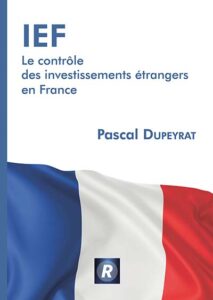
Regulation (EU) 2019-452 – framework for the screening of foreign direct investments into the Union
After several decades focused on promoting a free trade area and the unrestricted movement of capital, the European Union has gradually become aware of its Member States’ growing concerns regarding the protection of their strategic sectors. This shift in awareness materialized in February 2017, when Germany, France, and Italy officially petitioned the European Commission to establish stricter oversight of foreign investments targeting companies holding key technologies. Their request stemmed from a desire to ensure reciprocity and enhance economic security, marking a turning point in the EU’s traditionally open market policy.
It is against this backdrop that the European Union adopted, on 19 March 2019, a regulation establishing a framework for the screening of foreign direct investments within the Union. The european commission screening regulation (Regulation (EU) 2019/452 of the European Parliament and of the Council of 19 March 2019) entered into force in April 2019 and became fully operational in October 2020. This unprecedented instrument represents a major evolution in the EU’s approach to foreign investment governance.
A Framework Rooted in Cooperation – Regulation (EU) 2019-452
The regulation is built on two fundamental pillars. On the one hand, each Member State retains sovereign authority to assess the impact of a foreign investment on its national security and public order. On the other, a cooperative mechanism is introduced between Member States and the European Commission to enable collective risk assessment. This dynamic is designed to prevent domestic loopholes from being exploited to the detriment of the internal market as a whole.
The european commission screening regulation does not replace national foreign direct investment screening mechanisms. Rather, it complements them by allowing the Commission to issue non-binding opinions on sensitive transactions. This flexible balance between national sovereignty and EU-level coordination helps avoid protectionist drift while ensuring a harmonized approach to strategic challenges.
A Structured Yet Sovereignty-Respecting Harmonization
One of the core contributions of the european commission screening regulation lies in its establishment of a coherent set of non-binding recommendations. Member States remain free to maintain or forgo national screening mechanisms, but when such mechanisms are in place, they are encouraged to follow common principles: transparency, non-discrimination, proportionality, and clarity in screening criteria.
This harmonization is intended to prevent procedural disparities that could undermine the EU’s attractiveness, create opportunities for regulatory circumvention via cross-border structures, or result in legal uncertainty for investors. Member States are encouraged to take measures against circumvention, submit annual reports, and notify the Commission of any changes to their national regimes.
The Cooperation Mechanism: A Reinforced Network of Vigilance
The cooperative dimension introduced by the european commission screening regulation is a significant innovation. When a Member State examines a foreign investment, it may request input from other Member States and the European Commission. Likewise, any Member State may provide comments if it believes an investment in another Member State could threaten its own security.
This mechanism allows for a shared vigilance essential to the credibility of the system. It applies to all EU countries, regardless of whether they have implemented their own screening mechanisms. Cooperation is facilitated through designated contact points and involves the exchange of precise, proportionate, and goal-specific information.
Scope of the Regulation Regulation (EU) 2019-452 – Third Countries Only
The european commission screening regulation applies exclusively to investments originating from third countries, meaning those outside the European Economic Area. It does not apply to intra-EU capital flows or to portfolio investments.
The regulation provides clear definitions: a foreign direct investment involves the establishment or maintenance of a lasting and direct relationship between a foreign investor and an EU business. The screening process allows a Member State to authorize, prohibit, or condition such investments based on national security or public order considerations.
A Decision Support Tool for Member States
The european commission screening regulation is not designed to usurp national decision-making authority. Instead, it provides an analytical framework that supplements national mechanisms, helping Member States better identify and assess risks associated with specific investments.
Factors to consider when screening foreign direct investments include their impact on critical infrastructure, sensitive technologies, access to strategic raw materials, or exposure to sensitive data. Foreign government control and an investor’s historical behavior are also relevant to the risk assessment.
Regulation (EU) 2019-452 – a Non-Binding but Directive Framework
Although the european commission screening regulation 2019-452 emphasizes that foreign direct investment screening is not mandatory for Member States, it strongly encourages adherence to certain principles. These include clear procedural timelines, mechanisms to prevent circumvention, and responsiveness to feedback from the Commission and fellow Member States.
Two obligations arise for participating countries: the duty to share information on screened transactions, and the duty to alert others to foreign investments that may affect their interests. These duties may be exercised up to 15 months following the completion of an investment.
Regulation (EU) 2019-452 enhanced Cooperation Between States with Screening Mechanisms
Countries such as France, which maintain foreign direct investment screening regimes, are now able to cooperate more effectively with other Member States that have established similar mechanisms. Under the european commission screening regulation, France can notify the Commission and fellow Member States of any sensitive transaction and request their comments. Conversely, France may also comment on transactions occurring in other Member States.
A detailed timeline governs these exchanges: notification, requests for additional information, responses, and issuance of comments or opinions. In urgent situations, a Member State may shorten these deadlines. However, the final decision always remains with the Member State where the investment takes place.
Dialogue with States Without Screening Mechanisms
The european commission screening regulation also establishes channels of communication with Member States that have not implemented national screening regimes. Third countries or the Commission may notify such Member States, request information, or provide opinions on pending transactions.
This provision helps ensure that the EU is not divided between “protective” and “permissive” jurisdictions, by fostering structured dialogue even with States that choose not to adopt screening frameworks. It reflects a commitment to collective economic security and integrity across the Union.
A Requirement for Proportionality and Data Protection
In accordance with the european commission screening regulation, all requests for information must be limited to data strictly necessary for risk assessment. Information sharing must comply with EU data protection laws, including the GDPR and Regulation (EU) 2018/1725.
Sensitive or confidential information — such as trade secrets or classified data — must be rigorously protected. The regulation sets clear parameters for how such data may be exchanged between Member States and with the Commission, thereby preserving investor confidence while maintaining robust screening processes.
Safeguards for Foreign Investors
The european commission screening regulation 2019-452 acknowledges that foreign investors and affected companies must have access to legal remedies. Member States are required to ensure the availability of judicial or administrative appeal processes, which contributes to legal certainty and predictability.
These safeguards are essential to preserving the EU’s attractiveness to global investors and assuring partners that the regulation is not a tool for arbitrary or politically motivated decisions.
A Unique Role for the Commission in Cases of Union Interest
In instances where a foreign investment targets a Union program of strategic importance — such as Galileo, Copernicus, or Horizon Europe — the european commission screening regulation allows the Commission to play a more direct role.
These programs, listed in the annex to the regulation, reflect the EU’s vital interests. In such cases, the Commission may issue binding opinions or recommend protective measures in collaboration with the Member State concerned. This special competence reflects the emergence of a dual-track screening regime, combining national sovereignty with shared European responsibility.
A Strategic Policy Turning Point
The european commission screening regulation 2019-452 adopted in 2019 represents a decisive step toward a more strategic European economic policy. While it stops short of imposing binding rules, it creates a structured framework based on cooperation, transparency, and proportionality.
This new regime echoes similar developments in jurisdictions such as the United States, reinforcing the global trend toward protecting critical assets from foreign control. It is now incumbent upon the Member States — and particularly France — to fully embrace this framework, strengthen the resilience of their economies, and ensure that the European market remains open yet secure.
For further reading
Book: “IEF – Le contrôle des investissements étrangers en France”, Relians Editions, 2024
Livre “IEF Le contrôle des investissements étrangers en France”, ed Relians, 2024

Our expertise
Relians, a strategic and institutional advisory firm, has been supporting companies facing these challenges for over 20 years. Drawing on expert knowledge of applicable legislation, administrative practice, and relevant guidelines, we help our clients structure their operations securely, in full compliance with regulatory requirements and through constructive engagement with the French authorities.
Relians, a specialist in foreign direct investment screening.

